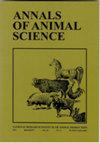Sustainable intensification – reaching towards climate resilience livestock production system
IF 2.2
4区 农林科学
Q2 AGRICULTURE, DAIRY & ANIMAL SCIENCE
引用次数: 0
Abstract
Abstract An ability to prepare, recover and adapt to frequent climatic variation is called “climate resilience.” Climate change now places additional pressure on the cattle industry, particularly in developing nations, which threatens the livelihood of small farmers. In 2013 “Food and Agriculture Organization” reported that the livestock sector accounts for nearly 1/3rd of agricultural gross production value globally. There are higher possibilities of the effective implications of sustainable intensification in the livestock production systems to determine production pathways that are more sustainable and productive with a minimum negative impact on the environment. The paper discusses the systematic review mingle with qualitative text analysis to explore the interrelation between sustainable intensification and resilient climate practices, specifically towards the livestock production system. The data for systematic review was taken from Scopus, Web of Science, and PubMed databases from 1995 till 2020, with total screened 94 articles in the final selection. The study's results revealed that all approaches involving environment-friendly practices with higher production efficiency, resource use efficiency and reachable to every farmer were considered sustainable intensification. The relevance of this sustainability analysis to climate resilience is illustrated by considering different types of livestock systems with concerned practices. So, the inclusion of appropriate technology in an appropriate system will open the door for sustainable intensification in the face of a climate-resilient livestock production system and finally lead the farming community towards sustainable development.可持续集约化——建立适应气候变化的畜牧生产系统
一种准备、恢复和适应频繁气候变化的能力被称为“气候适应能力”。气候变化现在给养牛业带来了额外的压力,特别是在发展中国家,这威胁到小农的生计。2013年,联合国粮食及农业组织报告称,畜牧业占全球农业总产值的近三分之一。畜牧业生产系统的可持续集约化更有可能产生有效影响,以确定对环境的负面影响最小的更具可持续性和生产力的生产途径。本文讨论了系统综述与定性文本分析相结合的方法,以探讨可持续集约化与弹性气候实践之间的相互关系,特别是针对畜牧业生产系统。系统评价的数据来源于1995年至2020年的Scopus、Web of Science和PubMed数据库,最终入选共筛选94篇文章。研究结果表明,所有涉及环境友好、生产效率高、资源利用效率高、每个农民都能接触到的方法都被认为是可持续集约化。可持续性分析与气候适应能力的相关性通过考虑具有相关做法的不同类型的牲畜系统来说明。因此,在适当的系统中纳入适当的技术,将为在气候适应型畜牧业生产系统面前实现可持续集约化打开大门,并最终引导农业社区走向可持续发展。
本文章由计算机程序翻译,如有差异,请以英文原文为准。
求助全文
约1分钟内获得全文
求助全文
来源期刊

Annals of Animal Science
农林科学-奶制品与动物科学
CiteScore
4.00
自引率
5.30%
发文量
138
审稿时长
6-12 weeks
期刊介绍:
Annals of Animal Science accepts original papers and reviews from the different topics of animal science: genetic and farm animal breeding, the biology, physiology and reproduction of animals, animal nutrition and feedstuffs, environment, hygiene and animal production technology, quality of animal origin products, economics and the organization of animal production.
 求助内容:
求助内容: 应助结果提醒方式:
应助结果提醒方式:


